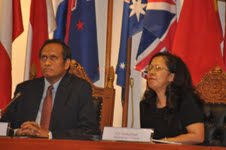Government organizes International Investment Conference

The Government of the Democratic Republic of Timor-Leste held the International Investment Conference, on October 21 and 22, at the Díli Convention Center (Mercado Lama), aiming to help the Government to devise strategies to attract investment to Timor-Leste. The theme of this conference was "Investment and Nation Building: Competitiveness, Lessons from Other Countries, and Policy Reform”.
This conference was opened by Vice Prime Minister José Luís Guterres and accompanied by Minister of Finance, Emilia Pires. This is the first high profile conference on investment ever to be held in Timor-Leste. It was about 150 delegates, ranging from senior government officials, representatives from the private sector, donor-countries including the diplomatic missions based in Timor-Leste and overseas.
The objective of the conference was to understand the economic conditions of Timor-Leste, experiences of other countries, and what policy reforms Timor-Leste need to adopt to attract investment in Timor-Leste.
It was also discussed investment against three backgrounds of Timor-Leste: first, the Government is on the verge of implementing the Strategic Development Plan (SDP) 2011-2030 with the objective to turn Timor-Leste into an upper middle-income country by 2030; second, the Government believes that this is possible to turn Timor-Leste into an upper middle-income country given the low basis of the economy, natural resources endowment, and potential in agriculture and tourism sector and the partnership with the private sector; third, the role of private sector, let alone foreign direct investment in Timor-Leste is small.
During the course of this conference, it has confirmed that agriculture, tourism and hydrocarbon sectors are the key sectors of Timor-Leste’s economy.
This conference has discussed six policy choices that Timor-Leste need to explore in view of the potentials and constraints of the country. First, improve the conditions of doing business in Timor-Leste includes creating fast business registration process; fasten land laws and one-stop shop. Second, explore ways to finance mega-projects with the private sector. Third, revisit our tax regime whether the reforms adopted in 2008 really served its intention to attract investment. Fourth, the Government needs to invest in infrastructure such as roads, power, telecommunications, and water and sanitation as the basic conditions. Fifth is borrowing. Finally, there are still challenges of relatively high price both of production and imports of goods and services in Timor-Leste.










































